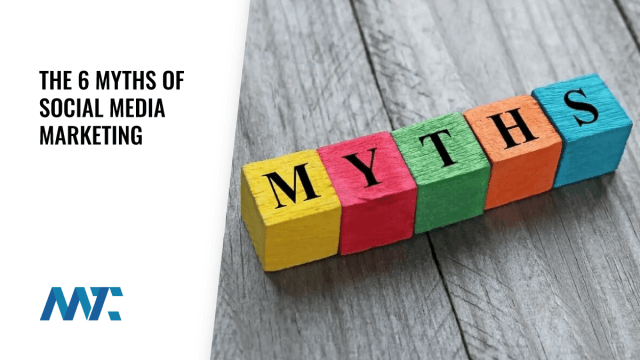I have a good friend who owns a home services business that I’ve helped over the years. He often tells me how his competitors are all over social media and he feels left behind because his company isn’t publishing there consistently. While social media has become integral to many businesses’ digital marketing strategies, the landscape has evolved significantly in recent years. Understanding how to effectively leverage social platforms in the current environment is important, and avoiding falling for outdated myths is essential.
There are two downsides to social media that I revealed to him, though:
Barely anyone was going to see his updates. Social media platforms have crippled organic visibility to brands to drive up paid ads. You must pay to promote your social media updates if you want someone to see them.
Barely anyone cares about his business. His company does extensive home repairs once a decade or two for his customers. While he does incredibly well via WOM referrals, even his happiest customers aren’t going to be excited about multiple posts every week about the work they already accomplished.
I’ll let you know the outcomes at the end of this article. In the meantime, here are six common myths about social media marketing that I discussed with him.
Social Media Myth #1: People On Social Media Have An Intent To Purchase
The first myth is that social media is like any other marketing channel. That’s not the case. If I enter a keyword in a search, I intend to identify a solution or research a product or service. If I open Facebook or another social media platform, I rarely do.
There are some exceptions, of course, like viewing decorating ideas on Pinterest or doing hashtag searches on Instagram… but those aren’t very common. Most consumer purchases on social media are emotional purchases that don’t cost much money.
This doesn’t mean I don’t believe social media marketing can’t work. My friend could build a prosperous social following if he had a hundred employees and multiple locations and could respond to every question online. But he doesn’t. Or… he could invest that time and effort in relevant advertising across search and social media and drive people with intent to call him.
Social Media Myth #2: Organic Social Media Activity Is All You Need
In the past, building a large organic following on social media could be a highly effective way to reach and engage audiences. However, social media platforms have increasingly prioritized paid content over organic posts from businesses to drive ad revenue.
While organic reach can still play a role, paid social media advertising is necessary to achieve any significant visibility and impact. One alternative to ads is influencer marketing and working with other influential brands or individuals that reach the same audience. Either way, it’s a monetary investment.
Social Media Myth #3: Social Media is a Destination Site
While social media platforms can be valuable for brand discovery and top-of-funnel engagement, they are rarely the final destination for conversions. Users typically don’t go to social media to make a purchase or take a specific action. There are exceptions, of course, like loyal customers following their favorite brands awaiting the next release. Even as social commerce continues to grow, other sales processes that require significant investment, negotiation, or contracts aren’t likely coming from a person going online to see the latest pics of their grandchildren.
Social Media Myth #4: Social Media Replaces Other Marketing Channels
Social media complements other digital marketing channels but is not a replacement. A strong website, email marketing, search engine optimization (SEO), and potentially other tactics like paid search and display advertising are all important components of a comprehensive digital strategy. Social media can amplify the impact of these efforts but shouldn’t be relied upon as the sole channel. The social media platform owns the audience and gives their attention to the highest bidder.
Social Media Myth #5: Engagement Is The Only Metric That Matters
While engagement (likes, comments, shares) can indicate resonance and brand affinity, it shouldn’t be the only social media metric you focus on. Depending on your specific business goals, metrics like reach, website traffic, lead generation, and conversion are often more important to track and optimize. Vanity metrics like follower counts and engagement rates don’t necessarily translate into business impact.
Social Media Myth #6: Set It and Forget It
Effective social media marketing requires ongoing effort and optimization, not a one-time setup. Consumer behaviors and platform algorithms are constantly evolving, so what worked well last year may not be effective today. It’s important to continually test new strategies, measure results, and adapt your approach based on performance data. Social media marketing should be an agile and iterative process, not a static task to be checked off a list.
Social media platforms want to sell ads and to do that; the best content is content that drives engagement. This may be controversial updates, pop culture items, memes, and other content that is either clickbait, viral in nature, or drives a ton of comments.
By understanding these myths and adapting your social media strategy accordingly, you can leverage social media platforms more effectively to achieve your business goals in today’s digital landscape. Focus on integrating social media into a holistic marketing strategy, prioritizing paid promotion, and continually optimizing your efforts based on data and results.
Ultimately, my friend didn’t believe me and moved most of his budget to social media. I provided tips and feedback for several months that grew their following and engagement. Six months later, he still didn’t have a single sale that could be attributed to the growing social media community he built. It was a costly experiment for him!
©2024 DK New Media, LLC, All rights reserved.
Originally Published on Martech Zone: The 6 Myths of Social Media Marketing in 2024

